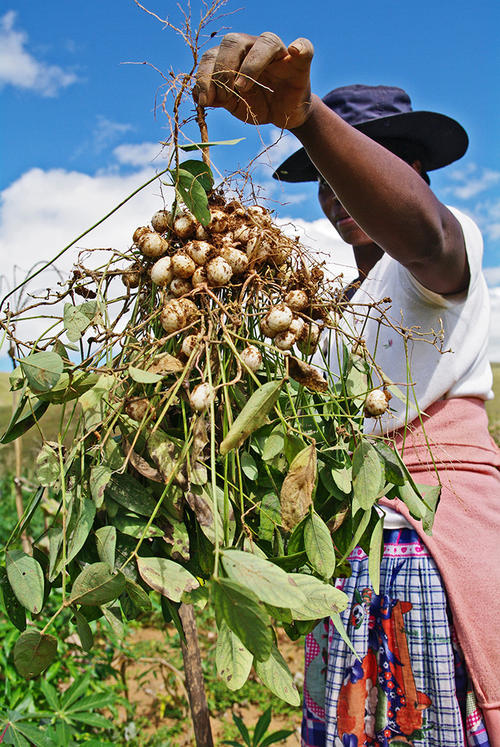The recently ended Fruit Logistica trade fair, where 25 Zimbabwean companies took part revealed some exciting opportunities for local producers.
Taking place from 5-7 April in Berlin, Germany, Fruit Logistica the largest world’s largest trade fair for horticultural players and is a strategic in connecting Zimbabwean exporters with buyers from leading markets across the world.
At the fair, ZimTrade – the country’s trade development and promotion organization – facilitated for 10 companies to participate as exhibitors whilst the other 15 participated in series of business-to-business meetings.
Striking from engagements with buyers is the demand of non-traditional export products from Zimbabwe, which are being identified as growing in demand across the world.
Interesting from the inquiries was the number of buyers who are looking for suppliers of nyimo/indlubu, also known as Bambara beans/nuts.
Although the global import values are still low, there is huge potential for growth, as people are looking at alternative forms of protein.
According to Trade Map, the global import bill of the product was just US$1.7 million in 2020, up from US$1.23 million in 2019.
What this figure shows is that countries that are quick to increase exports right now will likely command the largest share when the market grows bigger.
For Zimbabwe, the inquiries received at Fruit Logistica shows that buyers are looking at local farmers as potential suppliers and there is need to capitalize on this opportunity.
Understanding the product
Nyimo/indlubu has always been part of Zimbabwe’s delicacy for generations.
It is a good source of protein, easy to prepare, and usually consumed as breakfast or lunch by millions of people across the country.
Further to this, Bambara beans are not complicated to grow and can perform well in many soils, making it possible to grow across natural rainfall regions, dry areas.
This is a product that most communities can grow with easy, and they understand the processes required to boost production.
Most Bambara beans varieties take 3-6 months to mature, depending on the climate and offers quick wins for farmers who grow targeting commercial yields.
By most accounts, the product is considered as a low-impact crop, making it one of the products with high potential for areas that receive below-normal rainfall.
What is exciting, however, is not only the treasured history Zimbabwe has with the product, but also the potential to earn millions on the export markets as the demand for the product is anticipated to grow around the world.
Considering the current drive by the Second Republic to promote the cultivation of indigenous, and drought-tolerant crops that can perform well in harsh conditions, increased production of export-oriented Bambara beans will unlock export access for rural communities, which in turn will improve the contribution of the agricultural sector to national exports.
Apart from meeting global demand, Bambara beans can provide sustainable incomes for rural communities, particularly those who have not recorded promising maize harvests due to increase weather variability.
Further to this, Bambara beans can provide solutions towards improving the nation’s food and nutrition security, as well as generating income for rural communities through improved exports.
To improve income generation for rural communities, ZimTrade – the national trade development and promotion organization – is working with Welthungerhilfe and Empretec to improve competitiveness and export potential in inclusive value chains that are usually referred to as “pro-poor” value chains.
The Strengthening Competitiveness and Potential for Export for Inclusive Value Chains in Zimbabwe (SCOPE4IVC) 2020-2023 project is targeting Bambara, marula, and chilli products.
Here, ZimTrade and its partners will improve capacities of Micro, Small and Medium Enterprises (MSMEs) so that they meet requirements for exporting Bambara nuts, marula, and chilli to European Union and other markets.
The project contributes to the key result area of export product diversification covered under the National Export Strategy, launched by President Mnangagwa in 2019.
Potential markets for Bambara beans
The current world market for dried Bambara beans is still small, but with potential for growth.
For players who are looking to boost exports of the product, there is need to target current major importers, and these are Saudi Arabia, South Africa, USA, Chile, Uganda, UK, and Netherlands.
From these markets, Zimbabwe already enjoys trading relations with most of them and has even easier access to South Africa, which is the second largest importer of Bambara beans in the world.
Europe is believed to offer a relatively stable market for Bambara beans and growers should pay attention to meeting the required standards and volumes considering the rising interest in exotic cuisines by European consumers.
There is high potential for Zimbabwean growers to target Italy, United Kingdom and Netherlands markets.
To export Bambara beans to Europe, it is always important for exporters to adhere to the strict rules and obligations on food safety.
The general food law that regulates food safety in the European Union also applies to dried beans.
Exporters must make sure that the beans are traceable and that systems like the HACCP are well in place.
For African markets such as South Africa, local exporters can ride on the African Continental Free Trade Area or regional trade agreements such as the SADC Trade Protocol to enjoy low tariffs.
Consumption in Asian countries are expected to increase hence creating more market alternatives and Zimbabwean farmers producers are also encouraged to consider tapping into those markets.
Consolidation will improve market access
In most cases, there are challenges that are associated with producing the crop at commercial level, making it ideal for smallholder farmers who are looking to be integrated into export business.
However, since the export business is a game of numbers, potential exporters will need to consider consolidation so that they meet minimum order requirements.
This way, farmers will ensure that the little they produce can find its ways to export markets and sustain demand over longer periods of time.
To achieve this, concerted efforts must be made to mainstream group cohesion and embarking on aggregation as a way that smallholder farmers and smallholder farmers can tap into lucrative export destinations.
Consolidation and aggregation will increase their export volumes, reduce cost of freight, and improve the competitiveness of Zimbabwe-grown Bambara beans on export markets.







